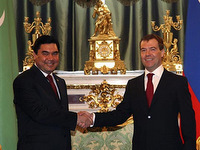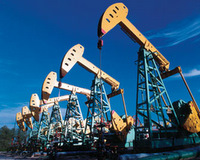Last month, the West officially lost the new "Great Game." The 20-year competition for natural resources and influence in Central Asia between the United States (supported by the European Union), Russia and China has, for now, come to an end, with the outcome in favor of the latter two. Western defeat was already becoming clear with the slow progress of the Nabucco pipeline and the strategic reorientation of some Central Asian republics toward Russia and China. Two recent events, however, confirmed it.
On Dec. 14, Chinese President Hu Jintao and the heads of state of Turkmenistan, Uzbekistan and Kazakhstan personally opened the valve of a new gas pipeline transporting Turkmen natural gas from the state-of-the-art processing facility of Samandepe to the city of Khorgoz, in China's western province of Xinjiang. The pipeline, developed by the Chinese state-owned energy giant, CNPC, has a capacity of 40 billion cubic meters and traverses almost 1,250 miles through four countries.
> Central Asia Map
Earlier in the month, on Dec. 3, the venture had received the blessings of Russian Prime Minister Vladimir Putin, who declared that Moscow was comfortable with the idea of Turkmen gas flowing eastwards to China. Putin's words further underscored ongoing Sino-Russian energy cooperation, which has made significant advances and is shaping the new political economy of energy in Central Asia and elsewhere. In an accord signed on Oct. 13, the two countries set the basis for a long-term partnership based on joint explorations in Russia and third countries, as well as cheap loans from Chinese banks to the Russian energy sector, even if complex pricing issues remain unresolved.
 Not long afterward, Russia achieved a major success on its own. On Dec. 22, in a meeting in Ashgabat also attended by high-level executives from Gazprom and Turkmengaz, Russian President Dmitri Medvedev and Turkmen President Gurbanguly Berdymukhamedov ended a gas dispute between their two countries. The dispute dated back to April, when Turkmen authorities blamed Gazprom for the explosion of a pipeline transporting Turkmen gas to Russia -- a move, they claimed, designed to avoid buying expensive Turkmen gas in a period of low demand.
Not long afterward, Russia achieved a major success on its own. On Dec. 22, in a meeting in Ashgabat also attended by high-level executives from Gazprom and Turkmengaz, Russian President Dmitri Medvedev and Turkmen President Gurbanguly Berdymukhamedov ended a gas dispute between their two countries. The dispute dated back to April, when Turkmen authorities blamed Gazprom for the explosion of a pipeline transporting Turkmen gas to Russia -- a move, they claimed, designed to avoid buying expensive Turkmen gas in a period of low demand.
In addition to the resumption of exports, now scheduled for the start of 2010, Medvedev's visit led to the signing of important documents on strategic cooperation in energy and engineering, which deepen and expand a 25-year agreement signed by the two countries in 2003. Amendments to existing contracts were made, and Gazprom agreed to purchase Turkmen gas at a price roughly equal to that of the European market, removing any incentive for the Caspian republic to look to the European Union and the international energy industry for natural gas sales.
With Turkmenistan already exporting over 70 billion cubic meters of gas a year and possibly not even possessing enough reserves to meet current obligations, it is unlikely that the country will seek new deals. Likewise, Kazakhstan, the other major natural resource producer in the region, is satisfied with its contracts with Russia and China. Its president, Nursultan Nazarbayev, recently declared that he will only approve foreign investment from countries and companies willing to cooperate on his authoritarian industrialization plan.
The developments will hardly endanger Western energy security. Even European gas supplies will not suffer any major long-term disruptions, as demand will be easily met by two projected Russian pipelines, Nord Stream and South Stream, as well as by a Nabucco project fed by Middle Eastern gas supplies.
However, the situation will have lasting consequences for the region, as pipelines do not only transport oil and gas. They also create long-term interdependencies between nations, and heavily condition modes of governance as well as strategic positioning in the countries involved. Expect, then, Russia and China to maintain near-absolute leverage in Central Asia in what amounts to a managed condominium.
 The West has only itself to blame for this outcome. Despite sharing regional interests with Russia and China -- ranging from disarmament to the eradication of terrorism and the drug trade -- the United States and the European Union have rarely proven themselves willing to come to terms with Moscow and Beijing on Central Asian affairs. In the field of energy, Western policy objectives have fluctuated indecisively between attempting to fully depoliticize the industry -- through legal instruments such as the Energy Charter -- and providing American and European corporations with dirigiste-style support, based on the misplaced assumption that their technological superiority would offer more attractive conditions to Central Asian leaders. On the other hand, Russia and China have elaborated innovative responses through a network of bilateral deals and the institutional structure of the Shanghai Cooperation Organization (SCO).
The West has only itself to blame for this outcome. Despite sharing regional interests with Russia and China -- ranging from disarmament to the eradication of terrorism and the drug trade -- the United States and the European Union have rarely proven themselves willing to come to terms with Moscow and Beijing on Central Asian affairs. In the field of energy, Western policy objectives have fluctuated indecisively between attempting to fully depoliticize the industry -- through legal instruments such as the Energy Charter -- and providing American and European corporations with dirigiste-style support, based on the misplaced assumption that their technological superiority would offer more attractive conditions to Central Asian leaders. On the other hand, Russia and China have elaborated innovative responses through a network of bilateral deals and the institutional structure of the Shanghai Cooperation Organization (SCO).
The West has also misunderstood the resilience of Russian leverage and soft power in the region and dramatically overestimated the appeal of its "normative power." By insisting on issues -- such as democracy and human rights -- that not only had no influence, but scared the local power elites, they increased the attractiveness of Beijing and its strict adherence to the principle of non-interference in domestic affairs.
Central Asia is now very low on President Barack Obama's agenda. In the first year of his administration, the United States has done little more than confirm its nominal support for Nabucco. However, it would be unwise to abandon a resource-rich region at the crossroads between Europe, Asia and the Middle East, close to such hotspots as Afghanistan, Iran and the Caucasus. The opportunities to tie Central Asia to the West through energy trade have for now waned, but regional developments should no longer be overlooked or disregarded by American policymakers.
Editors Note: Andrea Bonzanni is a post-graduate student at the Graduate Institute of International and Development Studies in Geneva. He has worked as a consultant for the United Nations and the World Bank and is currently an energy policy analyst for the Italian Center for Turkish Studies.


